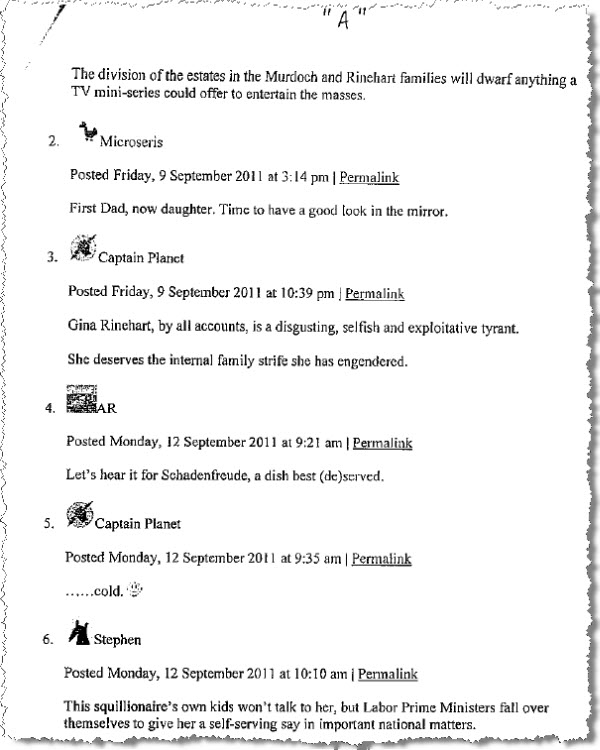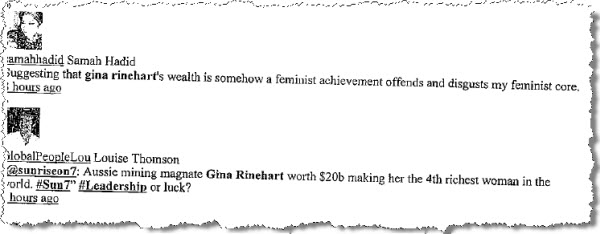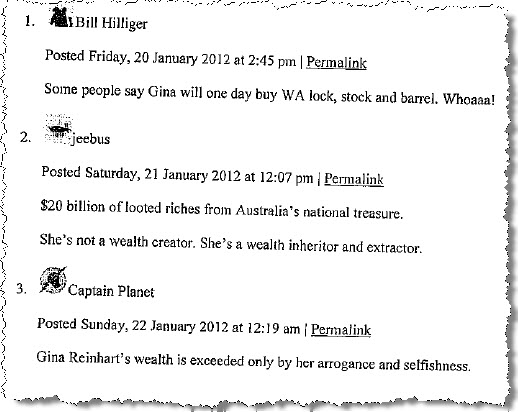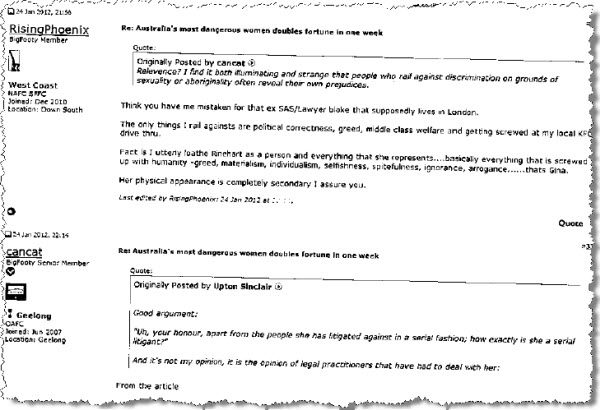Australia’s newest media mogul might need a crash course on new media. It appears her grasp of it is, shall we say, about as poor as some of the intra-family relationships she’s trying to keep from scrutiny.
Attached to the affidavit from Gina Rinehart’s lawyer outlining why she fears the lifting of the suppression order could jeopardise the safety of her family are a number of examples from … the internet. Including, ahem, us.

We in the media collectively hand-wring over how horrible comments can be under online stories. But there is a significant difference between nasty, crude and at times not particularly witty, and a genuine threat to someone’s life or property.
Exhibit A: yes, that’d be Crikey commenters. As usual everyone cops a serve, including the Labor government for watering down the mining tax. But no one’s threatening anyone’s safety here:

Then there’s someone’s Tumblr with a rather colourful word starting with “c”. Not very nice, no. But a rather amusing sub-heading: “And Solomon Lew is stealing your dreams, one swimming-pool sized piece of land at a time.”
Someone’s also been trawling Twitter and then, in a fine tribute to the analog era, photocopying it. (A big hello to everyone out there on the #auspol hashtag.):

Then there’s more from our faithful comment crew:

Oh, and something from the guys at BigFooty:

On it goes. OK, so you’d expect Rinehart’s lawyers to go looking for every possible skerrick of evidence that someone, somewhere might not like their client. Imagine all the billable hours racked up by Corrs’ lawyers surfing social media looking for people calling their client nasty things. Must’ve made a welcome change from their usual jobs.
But then there’s the separate matter of the security report that Rinehart commissioned, by former Army officer and security professional Michael Humphreys, which purports to detail the nature of the threats to Rinehart that make it necessary that no one know stuff about her. This is where the internet really comes in for a shellacking.
For example, did you know that “a feature of media reporting that has rapidly emerged in past few years is ‘crowd sourcing’ by ‘citizen journalists'”? Yes. According to Humphreys’s report: “‘Crowd sourcing’ is where individuals using mobile phones pursue reports on incidents and the activities of other individuals by feeding real time information to social media sites such as Facebook, YouTube and MySpace. People with high media profiles are particularly vulnerable to this type of reporting and for them it has security implications because their movements and activities can be tracked by members of the public and criminals.”
Not merely are those pyjama-clad “citizen journalists” putting real journalists out of work (via, presumably, their “weblogs”), they’re putting Rinehart in danger! “Crowdsourcing provides the media with powerful information collection capabilities that may raise profiles to the detriment of victims,” the lawyers complain.
What were we saying about élite victimhood a few weeks back?
The security report concludes that if the Rinehart suppression order was lifted, “it is also likely to be widely discussed in social media and on blog sites. Social media is likely to rapidly amplify and sensationalise issues.” And there you were thinking amplifying and sensationalising issues was the job of the mainstream media. Like any good beat-up job on the internet, the report also mentions the threat of cyber-attacks on Rinehart from “issue-motivated groups”.
Don’t let anyone suggest, however, that Humphreys didn’t do a comprehensive report. In trying to establish the media profile of John Hancock — born John Rinehart — Humphreys professed difficulties, because “John Hancock was one of the founding fathers of the United States of America, and is therefore extensively mentioned in articles and web news discussing American history” and “‘John Hancock’ is a colloquial expression for the signature of a person” (indeed, Humphreys might have worked out those two things are related due to Hancock’s rather large signature on the Declaration of Independence …).
Joking aside, bear in mind the logic of Rinehart’s suppression order: that no one should know anything about her because if they do, they might discuss her online, and therefore the risk that “organised criminals”, “petty” criminals, “deranged persons”, “issue-motivated groups”, “foreign governments” and “terrorists” might harm her or her family is increased.
On that basis, no wealthy individual or company should be discussed anywhere, ever. And this woman fancies herself as a media mogul?








Crikey encourages robust conversations on our website. However, we’re a small team, so sometimes we have to reluctantly turn comments off due to legal risk. Thanks for your understanding and in the meantime, have a read of our moderation guidelines.